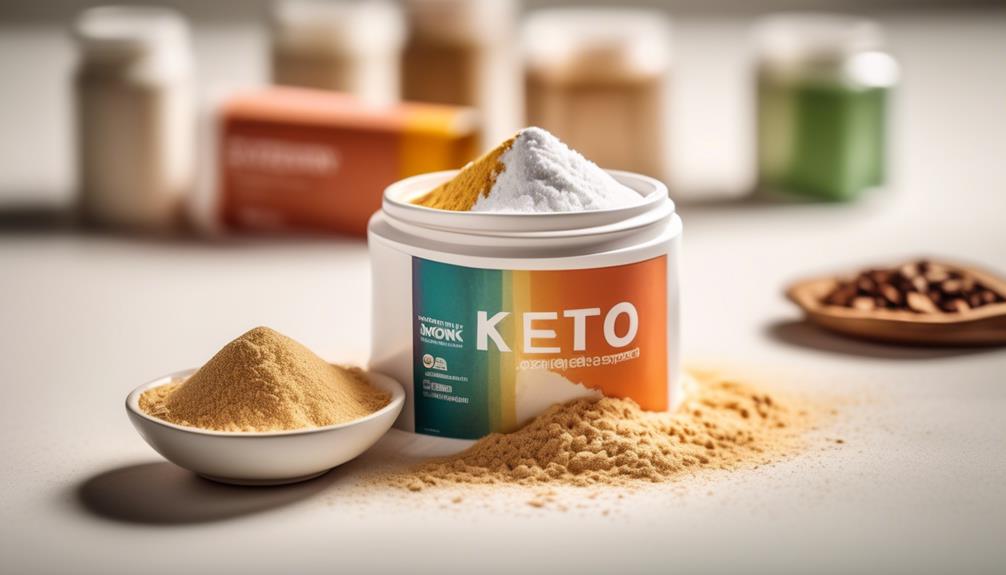Did you know that you can still satisfy your sweet tooth while following a keto diet? If you're looking for healthier alternatives to sugar in your desserts, you're in luck.
In this article, we'll explore the top 12 keto-friendly sugar substitutes that will allow you to enjoy your favorite treats guilt-free. From the well-known options like stevia and monk fruit to some lesser-known choices like lucuma powder and tagatose, we've got you covered.
So, if you're ready to discover these delicious and low-carb alternatives, keep on reading to find out more.
Stevia

When looking for a keto-friendly sugar substitute for your healthy desserts, Stevia is an excellent option to consider. Stevia is a natural sweetener derived from the leaves of the Stevia rebaudiana plant. It contains zero calories and has virtually no effect on blood sugar levels, making it a suitable choice for those following a ketogenic diet.
One of the advantages of cooking with Stevia is its intense sweetness. It's estimated to be 200 to 300 times sweeter than regular sugar, so you only need a small amount to achieve the desired sweetness in your desserts. Additionally, Stevia has a unique taste that enhances the flavor of your dishes without leaving a bitter aftertaste.
Besides being a low-calorie sweetener, Stevia also offers several health benefits. It has been used for centuries in South America as a traditional remedy for various ailments, including diabetes and high blood pressure. Research suggests that Stevia may help regulate blood sugar levels, improve insulin sensitivity, and lower blood pressure.
Moreover, Stevia has antioxidant properties, which can help protect your cells from damage caused by harmful free radicals. Some studies have also shown that Stevia may have anti-inflammatory and antimicrobial effects.
Monk Fruit
Monk Fruit, also known as Luo Han Guo, is a popular keto-friendly sugar substitute that can be used in healthy desserts. Its taste is often described as sweet, with a hint of caramel or honey-like flavor. This natural sweetener is derived from the monk fruit, a small green melon-like fruit native to Southeast Asia.
One of the key benefits of monk fruit is its zero-calorie nature, making it an excellent choice for those following a keto diet or looking to reduce their sugar intake. Unlike sugar, monk fruit doesn't raise blood sugar levels, making it suitable for individuals with diabetes or those watching their glycemic index.
In addition to its low-calorie content, monk fruit also contains powerful antioxidants called mogrosides. These compounds not only contribute to the fruit's sweet taste but also offer potential health benefits. Studies suggest that mogrosides may have anti-inflammatory, anti-cancer, and anti-diabetic effects.
Furthermore, monk fruit has been found to have a positive impact on gut health. It may help promote the growth of beneficial gut bacteria and reduce the risk of digestive issues.
Erythritol

Erythritol is a versatile and keto-friendly sugar substitute commonly used in healthy desserts. It's a natural sweetener that occurs in certain fruits and fermented foods. One of the major health benefits of erythritol is that it contains zero calories and has a glycemic index of zero, making it an excellent choice for those on a keto diet or looking to manage their blood sugar levels. Additionally, erythritol doesn't raise blood sugar or insulin levels, making it a suitable option for people with diabetes.
Another advantage of erythritol is that it doesn't contribute to tooth decay. Unlike regular sugar, erythritol can't be metabolized by oral bacteria, which means it doesn't promote dental plaque formation or acid production. This makes it a tooth-friendly alternative to sugar.
While erythritol is generally safe for consumption, it may cause some gastrointestinal side effects in high amounts. These side effects include bloating, gas, and diarrhea. However, most people tolerate erythritol well, and these issues are usually mild and temporary.
Xylitol
Xylitol is a sugar substitute that offers several health benefits. It can help improve dental health by reducing the risk of tooth decay and cavities.
Additionally, xylitol can be used in cooking and baking as a replacement for sugar, making it a suitable option for those following a ketogenic diet.
However, it's important to note that consuming excessive amounts of xylitol may cause digestive issues such as bloating and diarrhea.
Health Benefits of Xylitol
To enhance the readability of the discussion on the health benefits of xylitol, it's important to understand the potential advantages this sugar substitute offers.
Xylitol is known for its positive impact on dental health, making it a popular choice for those looking to reduce their sugar intake. Here are some key benefits of xylitol:
- Dental Health:
- Xylitol has been shown to reduce the risk of tooth decay and cavities.
- It inhibits the growth of bacteria that cause dental plaque.
- Xylitol stimulates saliva production, which helps to neutralize acids in the mouth.
- Comparison to Other Sugar Alcohols:
- Xylitol has a similar sweetness to sugar without the negative effects on blood sugar levels.
- Unlike other sugar alcohols, xylitol is well-tolerated by most individuals and doesn't cause digestive issues in moderate amounts.
- Xylitol has a lower glycemic index compared to other sweeteners, making it a suitable choice for people following a low-carb or keto diet.
With these dental health benefits and its favorable comparison to other sugar alcohols, xylitol is a promising sugar substitute for those seeking healthier dessert options.
Cooking and Baking With Xylitol
If you're looking to explore the world of low-carb desserts, cooking and baking with xylitol is a versatile and healthy option. Xylitol is a natural sugar substitute that's derived from plant sources, such as birch bark or corn cobs. It has become popular in the keto community due to its low glycemic index and minimal impact on blood sugar levels.
However, it's important to note that xylitol does come with some health risks, especially for pets, as it can be toxic to them. When using xylitol in your recipes, it's recommended to start with a smaller amount and gradually increase it, as it can have a cooling effect and may cause digestive issues in some individuals.
Additionally, it's important to keep xylitol away from pets and ensure it's stored safely. Overall, xylitol can be a great option for those looking to enjoy delicious low-carb desserts, but it's important to use it responsibly.
Potential Side Effects
Potential side effects of using xylitol as a sugar substitute in your cooking and baking include digestive issues and a cooling effect. While xylitol is generally considered safe for consumption, it's important to be aware of its potential risks and long-term effects.
Here are three key points to consider:
- Digestive issues: Xylitol can have a laxative effect when consumed in large quantities. Some people may experience bloating, gas, or diarrhea after consuming foods or drinks sweetened with xylitol. It's recommended to start with small amounts and gradually increase the intake to avoid digestive discomfort.
- Cooling effect: Xylitol has a cooling sensation in the mouth, similar to mint. This can be desirable in some desserts but mightn't be appealing to everyone. It's important to consider if this cooling effect aligns with your taste preferences before using xylitol as a sugar substitute.
- Long-term effects: While xylitol has been approved as safe for consumption by regulatory authorities, long-term studies on its effects are limited. Some research suggests that excessive consumption of xylitol may lead to dental issues or have a laxative effect. It's advisable to consume xylitol in moderation and consult with a healthcare professional if you have any concerns.
Allulose
When it comes to keto-friendly sugar substitutes, Allulose has become increasingly popular due to its unique properties. One of the main points to consider is its taste and texture, as Allulose closely resembles sugar without the aftertaste often associated with other sugar substitutes.
Additionally, Allulose has a minimal impact on blood sugar levels, making it a suitable option for those following a low-carb or ketogenic diet.
Lastly, while Allulose isn't as widely available as other sugar substitutes, it's becoming more accessible and its cost is gradually decreasing.
Taste and Texture
To enhance the taste and texture of your keto-friendly desserts, consider incorporating allulose as a sugar substitute. Allulose is a natural sweetener that can provide the sweetness you desire without the health concerns associated with regular sugar. Here are some reasons why allulose is a great alternative:
- No impact on blood sugar: Allulose isn't metabolized by the body and doesn't raise blood sugar levels, making it suitable for those following a keto or low-carb diet.
- Similar taste to sugar: Allulose has a taste similar to sugar, so you won't have to compromise on the flavor of your desserts.
- No aftertaste: Unlike some other sugar substitutes, allulose doesn't leave a bitter or artificial aftertaste, ensuring a pleasant eating experience.
Glycemic Impact
As we explore the glycemic impact of allulose, a natural sweetener with no impact on blood sugar levels, we can better understand its suitability for individuals following a keto or low-carb diet.
The glycemic index (GI) is a measure of how quickly a food raises blood sugar levels. Foods with a high GI are quickly digested and cause a rapid increase in blood sugar, while foods with a low GI are digested slowly, leading to a more gradual rise in blood sugar.
Allulose has a GI of zero, meaning it doesn't raise blood sugar levels. This makes it an excellent choice for those on a keto or low-carb diet, as it allows them to enjoy sweet-tasting desserts without affecting their blood sugar levels.
Availability and Cost
Allulose, a keto-friendly sugar substitute, is readily available in stores and online at an affordable cost.
Here are some key points about the availability and cost of Allulose:
- Wide availability: Allulose can be found in major grocery stores, health food stores, and specialty food stores. It's also available for purchase online through various retailers, making it easily accessible to consumers.
- Reasonable cost: While the price may vary depending on the brand and quantity, Allulose is generally priced competitively compared to other sugar alternatives. It offers a cost-effective option for those following a keto diet or looking to reduce their sugar intake.
- Bulk options: Many online retailers offer bulk packaging options, allowing consumers to purchase larger quantities of Allulose at a discounted price. This can be particularly beneficial for individuals who frequently use Allulose in their cooking and baking.
Inulin
Inulin, a versatile sugar substitute, is commonly used in keto-friendly desserts due to its low glycemic impact and potential health benefits. Derived from plants like chicory root, inulin is a type of dietary fiber that has a sweet taste but doesn't raise blood sugar levels. As a result, it's an excellent option for those following a ketogenic diet who want to satisfy their sweet tooth without compromising their goals.
One of the key benefits of inulin is its ability to support digestive health. It acts as a prebiotic, which means it provides food for beneficial bacteria in the gut. By promoting the growth of these bacteria, inulin can help improve digestion and enhance nutrient absorption.
Inulin is also known for its potential to promote weight loss. Due to its high fiber content, it can help create a feeling of fullness and reduce calorie intake. Additionally, inulin may help regulate blood sugar levels and improve insulin sensitivity, which are essential factors in weight management.
When it comes to incorporating inulin into keto-friendly desserts, the options are plentiful. You can use it as a sweetener in baked goods, like cookies and cakes, or add it to smoothies and puddings for a creamy texture. With its low glycemic impact and potential health benefits, inulin is a fantastic sugar substitute for keto dieters looking for guilt-free indulgence.
Swerve

Swerve is a popular sugar substitute that's often used in keto-friendly desserts. It's a zero-calorie sweetener made from a combination of erythritol and oligosaccharides, which are plant-based fibers.
Here are some key points about Swerve that you should know:
- Swerve Alternatives:
- Erythritol: If you can't find Swerve or prefer a single-ingredient alternative, erythritol is a great option. It has a similar sweetness profile and zero-calorie content.
- Stevia: Another popular sugar substitute, stevia is derived from the leaves of the stevia plant. It's intensely sweet, so a little goes a long way.
- Monk Fruit Sweetener: Made from the extract of monk fruit, this natural sweetener has zero calories and a similar sweetness to sugar.
- Swerve in Baking:
- One of the benefits of Swerve is its ability to brown and caramelize, which is important in baking. It can help achieve a similar texture and taste to traditional sugar.
- Swerve measures cup-for-cup like sugar, making it easy to substitute in recipes. However, it may have a cooling effect when used in large amounts, so adjust accordingly.
- Swerve can also be used in frostings, sauces, and beverages to add sweetness without the added carbs and calories.
Yacon Syrup
Yacon syrup, a natural sweetener derived from the root of the yacon plant, is gaining popularity as a keto-friendly sugar substitute. It offers several health benefits that make it an excellent choice for those following a ketogenic diet.
Yacon syrup is low in calories and has a low glycemic index, meaning it doesn't cause a rapid spike in blood sugar levels. This makes it suitable for individuals who need to control their blood sugar levels, such as those with diabetes or insulin resistance.
In addition to being a natural sugar substitute, yacon syrup has been linked to weight loss. Its high soluble fiber content can help promote feelings of fullness and reduce calorie intake. Yacon syrup also acts as a prebiotic, nourishing the beneficial bacteria in your gut and promoting a healthy digestive system. Studies have shown that consuming yacon syrup can improve insulin sensitivity, making it a favorable option for individuals with metabolic disorders.
When using yacon syrup in keto desserts, keep in mind that it's sweeter than regular sugar, so you'll need to adjust the amounts accordingly. You can use it in baking, as a topping for pancakes or yogurt, or even in homemade salad dressings.
Compared to other keto-friendly sweeteners like erythritol or stevia, yacon syrup offers a unique flavor profile and additional health benefits. So, if you're looking for a natural, low-calorie sweetener that won't spike your blood sugar levels, consider giving yacon syrup a try.
Coconut Sugar

Coconut sugar is a natural sweetener derived from the sap of coconut palm trees. It's often touted as a healthier alternative to traditional sugar due to its lower glycemic index and higher nutrient content.
When used in keto desserts, coconut sugar can add a rich caramel-like flavor while keeping the carbohydrate content in check.
Comparing coconut sugar to other keto-friendly sweeteners can help you make an informed choice for your low-carb treats.
Nutritional Benefits of Coconut Sugar
What are the nutritional benefits of using coconut sugar in your desserts?
Coconut sugar, a popular alternative to traditional sugar, offers several health benefits. Here are three reasons why you should consider using coconut sugar in your desserts:
- Lower glycemic index: Unlike regular sugar, coconut sugar has a lower glycemic index, which means it causes a slower rise in blood sugar levels. This can be beneficial for those with diabetes or those looking to maintain stable blood sugar levels.
- Nutrient-rich: Coconut sugar contains essential nutrients like iron, zinc, calcium, and potassium. While the amounts may be small, every bit counts towards a healthy diet.
- Natural source: Coconut sugar is derived from the sap of coconut palm trees. It's minimally processed, making it a more natural sweetener option compared to highly refined sugars.
How to Use Coconut Sugar in Keto Desserts
When incorporating coconut sugar into your keto desserts, there are a few simple ways to ensure you maintain the health benefits it offers.
First, remember that coconut sugar is still a form of sugar, albeit with a lower glycemic index compared to regular table sugar. Therefore, it's important to use coconut sugar in moderation, even in keto recipes.
Additionally, consider pairing coconut sugar with other low-carb sweeteners like stevia or erythritol to further reduce the overall sugar content.
Keep in mind that coconut sugar has a distinct flavor that may not work well in all desserts, so it's best suited for recipes where its caramel-like taste can shine.
Comparing Coconut Sugar to Other Keto-Friendly Sweeteners
Comparing coconut sugar to other keto-friendly sweeteners, such as stevia or erythritol, allows you to make informed choices when creating healthy desserts. Here are the key points to consider:
- Coconut sugar vs. other natural sweeteners:
- Coconut sugar is derived from the sap of coconut palm trees, while stevia is a plant-based sweetener and erythritol is a sugar alcohol.
- Coconut sugar contains trace amounts of nutrients like iron, zinc, and potassium, whereas stevia and erythritol have zero calories and no nutritional value.
- Benefits of using coconut sugar in keto desserts:
- Coconut sugar has a lower glycemic index than regular sugar, meaning it causes a slower rise in blood sugar levels.
- It provides a caramel-like flavor and can be easily substituted for regular sugar in recipes.
- Coconut sugar is also less processed compared to artificial sweeteners, making it a more natural option.
When choosing a sweetener for your keto desserts, consider the nutritional profile, taste, and overall impact on blood sugar levels.
Lucuma Powder

Lucuma powder is a versatile and nutritious keto-friendly sugar substitute that can be used to create delicious and healthy desserts. This natural sweetener is derived from the lucuma fruit, which is native to South America. Lucuma powder offers several health benefits, making it an excellent alternative to traditional sugar.
One of the main health benefits of lucuma powder is its low glycemic index (GI). Foods with a low GI release sugar slowly into the bloodstream, preventing spikes in blood sugar levels. This is particularly important for individuals following a keto diet, as they aim to maintain stable blood sugar levels.
In addition to its low GI, lucuma powder is rich in antioxidants, vitamins, and minerals. It contains beta-carotene, which is converted into vitamin A in the body and supports healthy vision and immune function. Lucuma powder also provides iron, calcium, and potassium.
When it comes to recipes, lucuma powder can be used to sweeten various desserts. You can add it to smoothies, ice creams, and baked goods like cookies and cakes. Its unique flavor, described as a blend of caramel and sweet potato, adds depth to any dish.
Chicory Root Fiber
Chicory root fiber is a versatile and healthy option for those seeking a keto-friendly sugar substitute. This natural sweetener is derived from the root of the chicory plant and offers a range of benefits.
Here are three reasons why you should consider using chicory root fiber in your cooking:
- Low-carb alternative: Chicory root fiber is a great choice for individuals following a ketogenic diet as it contains minimal net carbs. It has a low glycemic index, meaning it doesn't cause a spike in blood sugar levels, making it suitable for those looking to maintain stable blood sugar levels while enjoying sweet treats.
- Improves gut health: Chicory root fiber is a prebiotic, which means it serves as food for the beneficial bacteria in your gut. By promoting the growth of these good bacteria, it supports a healthy gut microbiome and aids digestion.
- Enhances texture and flavor: Chicory root fiber can be used as a sugar substitute in various recipes, including baked goods and beverages. It adds a subtle sweetness and helps create a moist texture in your dishes. Additionally, it can provide a caramel-like flavor, enhancing the taste of your desserts.
While chicory root fiber offers many benefits, it's important to note that excessive consumption may lead to digestive issues such as bloating and gas. Moderation is key when using this sweetener in your cooking.
Tagatose

Tagatose is a keto-friendly sugar substitute that offers a range of benefits for those looking to reduce their sugar intake while still enjoying sweet treats. It's a naturally occurring sugar found in small amounts in dairy products and some fruits. Tagatose has become popular in the keto community because it has a minimal impact on blood sugar levels and can be used as a replacement for regular sugar in baking and cooking.
One of the potential health risks associated with tagatose is its gastrointestinal side effects. Some individuals may experience digestive issues such as bloating, gas, and diarrhea when consuming tagatose in large amounts. It's important to start with small doses and gradually increase the intake to assess your tolerance.
If you're looking for alternatives to tagatose, there are several options available. Erythritol is a sugar alcohol that's commonly used as a sugar substitute in keto-friendly desserts. It has a similar taste and texture to sugar but doesn't raise blood sugar levels. Stevia is another popular choice, as it's a natural sweetener derived from the leaves of the stevia plant. It's extremely low in calories and has no impact on blood sugar levels.
Conclusion
In conclusion, there are a variety of keto-friendly sugar substitutes that can be used to create delicious and healthy desserts.
Stevia, monk fruit, erythritol, xylitol, and allulose are all excellent options for those following a ketogenic diet. These substitutes provide sweetness without adding a significant amount of carbohydrates or calories. They can be used in baking, cooking, and even in beverages.
Additionally, coconut sugar, lucuma powder, chicory root fiber, and tagatose can also be used sparingly. While these alternatives may have slightly more carbohydrates than the previous options, they are still lower in glycemic impact compared to traditional sugar.
With these alternatives, you can satisfy your sweet tooth without compromising your health. They allow you to enjoy desserts and treats while staying in ketosis. Plus, many of these substitutes have a similar taste to sugar, so you won't feel like you're missing out.
So, why not give these substitutes a try and enjoy guilt-free desserts on your keto journey? Experiment with different options and find the ones that work best for you. With a little creativity, you can continue to enjoy sweet treats while following a ketogenic lifestyle.







